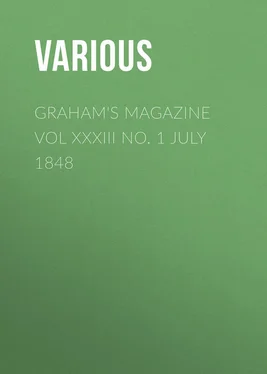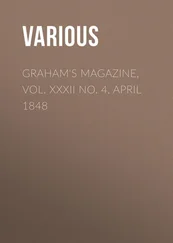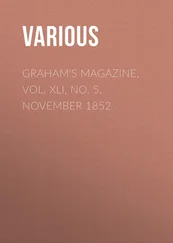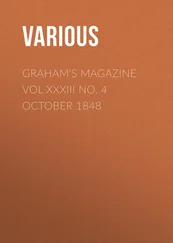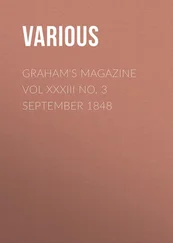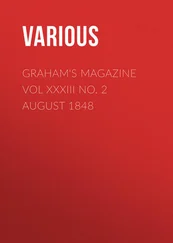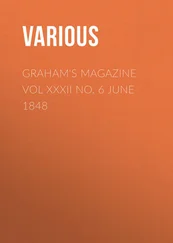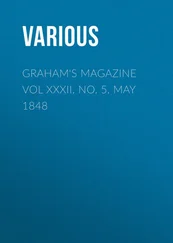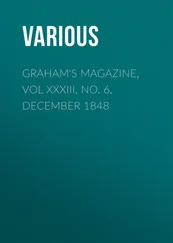Various - Graham's Magazine Vol XXXIII No. 1 July 1848
Здесь есть возможность читать онлайн «Various - Graham's Magazine Vol XXXIII No. 1 July 1848» — ознакомительный отрывок электронной книги совершенно бесплатно, а после прочтения отрывка купить полную версию. В некоторых случаях можно слушать аудио, скачать через торрент в формате fb2 и присутствует краткое содержание. Издательство: Иностранный паблик, Жанр: periodic, literature_19, foreign_edu, на английском языке. Описание произведения, (предисловие) а так же отзывы посетителей доступны на портале библиотеки ЛибКат.
- Название:Graham's Magazine Vol XXXIII No. 1 July 1848
- Автор:
- Издательство:Иностранный паблик
- Жанр:
- Год:неизвестен
- ISBN:нет данных
- Рейтинг книги:4 / 5. Голосов: 1
-
Избранное:Добавить в избранное
- Отзывы:
-
Ваша оценка:
- 80
- 1
- 2
- 3
- 4
- 5
Graham's Magazine Vol XXXIII No. 1 July 1848: краткое содержание, описание и аннотация
Предлагаем к чтению аннотацию, описание, краткое содержание или предисловие (зависит от того, что написал сам автор книги «Graham's Magazine Vol XXXIII No. 1 July 1848»). Если вы не нашли необходимую информацию о книге — напишите в комментариях, мы постараемся отыскать её.
Graham's Magazine Vol XXXIII No. 1 July 1848 — читать онлайн ознакомительный отрывок
Ниже представлен текст книги, разбитый по страницам. Система сохранения места последней прочитанной страницы, позволяет с удобством читать онлайн бесплатно книгу «Graham's Magazine Vol XXXIII No. 1 July 1848», без необходимости каждый раз заново искать на чём Вы остановились. Поставьте закладку, и сможете в любой момент перейти на страницу, на которой закончили чтение.
Интервал:
Закладка:
"I should not have supposed, sir," replied the boy, blushing very deeply, partly it might be from the nature of the subject under discussion, and partly from the strength of his emotions, "that any cavalier could have regarded it otherwise. It seems to me that to betray a friend's honor is a far blacker thing than to betray his life – and surely no man with one pretension to honor, would attempt to justify that."
"I am happy to see, Raoul, that you think so correctly on this point. Hold to your creed, my dear boy, for there are who shall try ere long to shake it. But be sure that is the creed of honor. But, although I think La Rochederrien disgraced himself even in this, it was not for this only that I termed him, as I deem him, the very vilest and most infamous of mankind. For when he had led that poor lady into sin; when she had surrendered herself up wholly to his honor; when she had placed the greatest trust – although a guilty trust, I admit – in his faith and integrity that one human being can place in another, the base dog betrayed her. He boasted of her weakness, of Kerguelen's dishonor, of his own infamy."
"And did not they to whom he boasted of it," exclaimed the noble boy, his face flushing fiery red with excitement and indignation, "spurn him at once from their presence, as a thing unworthy and beyond the pale of law."
"No, Raoul, they laughed at him, applauded his gallant success, and jeered at the Lord of Kerguelen."
"Great heaven! and these were gentlemen!"
"They were called such, at least; gentlemen by name and descent they were assuredly, but as surely not right gentlemen at heart. Many of them, however, in cooler moments, spoke of the traitor and the braggart with the contempt and disgust he merited. Some friend of Kerguelen's heard what had passed, and deemed it his duty to inform him. The most unhappy husband called the seducer to the field, wounded him mortally, and – to increase yet more his infamy – even in the agony of death the slave confessed the whole, and craved forgiveness like a dog. Confessed the woman's crime – you mark me, Raoul! – had he died mute, or died even with a falsehood in his mouth, as I think he was bound to do in such extremity, affirming her innocence with his last breath, he had saved her, and perhaps spared her wretched lord the misery of knowing certainly the depth of his dishonor."
The boy pondered for a moment or two without making any answer; and although he was evidently not altogether satisfied, probably would not have again spoken, had not his father, who read what was passing in his mind, asked him what it was that he desired to know further.
Raoul smiled at perceiving how completely his father understood him, and then said at once, without pause or hesitation —
"I understand you to say, sir, that you thought the wretched man of whom we spoke was bound, under the extremity in which he stood, to die with a falsehood in his mouth. Can a gentleman ever be justified in saying the thing that is not? Much more can it be his bounden duty to do so?"
"Unquestionably, as a rule of general conduct, he cannot. Truth is the soul of honor; and without truth, honor cannot exist. But this is a most intricate and tangled question. It never can arise without presupposing the commission of one guilty act – one act which no good or truly moral man would commit at all. It is, therefore, scarcely worth our while to examine it. But I do say, on my deliberate and grave opinion, that if a woman, previously innocent and pure, have sacrificed her honor to a man, that man is bound to sacrifice every thing, his life without a question, and I think his truth also, in order to preserve her character, so far as he can, scathless. But we will speak no more of this. It is an odious subject, and one of which, I trust, you, Raoul, will never have the sad occasion to consider."
"Oh! never, father, never! I," cried the ingenuous boy, "I must first lose my senses, and become a madman."
"All men are madmen, Raoul," said the church-man, who stood in the relation of maternal uncle to the youth, "who suffer their passions to have the mastery of them. You must learn, therefore, to be their tyrant, for if you be not, be well assured that they will be yours – and merciless tyrants they are to the wretches who become their subjects."
"I will remember what you say, sir," answered the boy, "and, indeed, I am not like to forget it, for, altogether, this is the saddest day I ever have passed; and this is the most horrible and appalling story that I ever have heard told. It was but just that the Lord of Kerguelen should die, for he did a murder; and since the law punishes that in a peasant, it must do so likewise with a noble. But to break him upon the wheel! – it is atrocious! I should have thought all the nobles of the land would have applied to the king to spare him that horror."
"Many of them did apply, Raoul; but the king, or his ministers in his name, made answer, that during the Regency the Count Horn was broken on the wheel for murder, and therefore that to behead the Lord of Kerguelen for the same offence, would be to admit that the Count was wrongfully condemned."
"Out on it! out on it! what sophistry. Count Horn murdered a banker, like a common thief, for his gold, and this unhappy lord hath done the deed for which he must suffer in a mistaken sense of honor, and with all tenderness compatible with such a deed. There is nothing similar or parallel in the two cases; and if there were, what signifies it now to Count Horn, whether he were condemned rightfully or no; are these men heathen, that they would offer a victim to the offended manes of the dead? But is there no hope, my father, that his sentence may be commuted?"
"None whatsoever. Let us trust, therefore, that he has died penitent, and that his sufferings are already over; and let us pray, ere we lay us down to sleep, that his sins may be forgiven to him, and that his soul may have rest."
"Amen!" replied the boy, solemnly, at the same moment that the ecclesiastic repeated the same word, though he did so, as it would seem, less from the heart, and more as a matter of course.
Nothing further was said on that subject, and in truth the conversation ceased altogether. A gloom was cast over the spirits of all present, both by the imagination of the horrors which were in progress at that very moment, and by the recollection of the preceding enormities of which this was but the consummation; but the young Viscount Raoul was so completely engrossed by the deep thoughts which that conversation had awakened in his mind, that his father, who was a very close observer, and correct judge of human nature, almost regretted that he had spoken, and determined, if possible, to divert him from the gloomy revery into which he had fallen.
"Viscount," said he, after a silence which had endured now for many minutes, "when did you last wait upon Mademoiselle Melanie d'Argenson?"
Raoul's eyes, brightened at the name, and again the bright blush, which I noticed before, crossed his ingenuous features; but this time it was pleasure, not embarrassment, which colored his young face so vividly.
"I called yesterday, sir;" he answered, "but she was abroad with the countess, her mother. In truth, I have not seen her since Friday last."
"Why that is an age, Raoul! are you not dying to see her again by this time. At your age, I was far more gallant."
"With your permission, sir, I will go now and make my compliments to her."
"Not only my permission, Raoul, but my advice to make your best haste thither. If you go straight-ways, you will be sure to find her at home, for the ladies are sure not to have ventured abroad with all this uproar in the streets. Take Martin, the equerry, with you, and three of the grooms. What will you ride? The new Barb I bought for you last week? Yes! as well him as any; and, hark you, boy, tell them to send Martin to me first, I will speak to him while you are beautifying yourself to please the beaux yeux of Mademoiselle Melanie."
Читать дальшеИнтервал:
Закладка:
Похожие книги на «Graham's Magazine Vol XXXIII No. 1 July 1848»
Представляем Вашему вниманию похожие книги на «Graham's Magazine Vol XXXIII No. 1 July 1848» списком для выбора. Мы отобрали схожую по названию и смыслу литературу в надежде предоставить читателям больше вариантов отыскать новые, интересные, ещё непрочитанные произведения.
Обсуждение, отзывы о книге «Graham's Magazine Vol XXXIII No. 1 July 1848» и просто собственные мнения читателей. Оставьте ваши комментарии, напишите, что Вы думаете о произведении, его смысле или главных героях. Укажите что конкретно понравилось, а что нет, и почему Вы так считаете.
